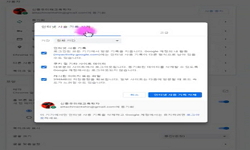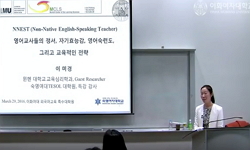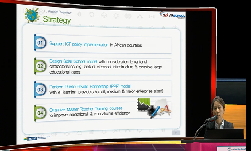This study analyzed the present condition of elementary school students' Internet use according to how long they use the computer a day, how long they use the Internet a day, the period they use it, where they usually use it, for what reason they use ...
http://chineseinput.net/에서 pinyin(병음)방식으로 중국어를 변환할 수 있습니다.
변환된 중국어를 복사하여 사용하시면 됩니다.
- 中文 을 입력하시려면 zhongwen을 입력하시고 space를누르시면됩니다.
- 北京 을 입력하시려면 beijing을 입력하시고 space를 누르시면 됩니다.

초등학생의 인터넷 사용과 자기효능감 및 자기통제력과의 관계 = The Relationship between the Internet Use and Self-Efficacy and Self-Control of Elementary School Students
한글로보기https://www.riss.kr/link?id=A104048680
- 저자
- 발행기관
- 학술지명
- 권호사항
-
발행연도
2010
-
작성언어
Korean
-
주제어
Internet Use ; Self-efficacy ; Self-control ; Cyber Space ; 인터넷 사용 ; 자기효능감 ; 자기통제력
-
등재정보
KCI등재
-
자료형태
학술저널
-
수록면
1-20(20쪽)
-
KCI 피인용횟수
2
- 제공처
-
0
상세조회 -
0
다운로드
부가정보
다국어 초록 (Multilingual Abstract)
This study is to supply the basic data for proper Internet use of the elementary school students by examining not only the differences between self-efficacy and self-control but the differences between the time spent on the Internet use and self-efficacy and self-control by sex, by grade and by region.
These are the findings of the study.
Firstly, the present conditions that the elementary school students use the Internet were analyzed according to their sex, grade and region. As a result of that, there was a meaningful difference in how long they use the computer a day, where they use it, why they use it and for what reasons they use it by sex.
Secondly, as a result of analyzing the Internet using time according to the group using the Internet less than one hour and the group using it more than one hour, there was a meaningful difference in the Internet using types.
Thirdly, as a result of examining the self-efficacy and self-control by sex, by grade and by region, there was not a meaningful difference in self-efficacy but there was such a meaningful difference in self-control as the fifth graders have a high self-control and the students in cities have a high self-control that there was a meaningful difference by grade and region.
This study analyzed the present condition of elementary school students' Internet use according to how long they use the computer a day, how long they use the Internet a day, the period they use it, where they usually use it, for what reason they use it, how they use it, for how long a week they use it based on the way they use it.
This study is to supply the basic data for proper Internet use of the elementary school students by examining not only the differences between self-efficacy and self-control but the differences between the time spent on the Internet use and self-efficacy and self-control by sex, by grade and by region.
These are the findings of the study.
Firstly, the present conditions that the elementary school students use the Internet were analyzed according to their sex, grade and region. As a result of that, there was a meaningful difference in how long they use the computer a day, where they use it, why they use it and for what reasons they use it by sex.
Secondly, as a result of analyzing the Internet using time according to the group using the Internet less than one hour and the group using it more than one hour, there was a meaningful difference in the Internet using types.
Thirdly, as a result of examining the self-efficacy and self-control by sex, by grade and by region, there was not a meaningful difference in self-efficacy but there was such a meaningful difference in self-control as the fifth graders have a high self-control and the students in cities have a high self-control that there was a meaningful difference by grade and region.
국문 초록 (Abstract)
초등학생의 인터넷 사용현황을 성별, 학년별, 지역별로 분석한 결과, 성별로는 하루 평균 컴퓨터 사용 시간, 사용 장소, 사용 목적, 인터넷 활용 유형이 매우 유의한 차이가 있었고 하루 평균 인터넷 사용시간, 인터넷 활용 유형에서도 유의한 차이가 있었다. 성별, 학년별, 지역별 자기효능감 및 자기통제력의 차이를 살펴본 결과 자기효능감에서는 유의하지 않았으나 자기통제력에서는 학년별, 지역별에서는 유의한 차이가 있었다. 5학년, 도시 지역은 자기통제력이 매우 높다는 결과가 나왔으며 6학년, 농촌지역의 자기통제력은 낮다는 결과가 나왔다. 자기통제력이 낮을 경우 인터넷의 과다 사용은 학업성취나 대인관계의 어려움을 겪으며 충동적인 행동 등 부정적인 행동들을 하게 되는 원인이 되므로 학생들의 자기통제력을 높일 수 있는 대안을 연구하는 것은 매우 의미가 있음을 알 수 있었다.
초등학생의 인터넷 사용시간과 자기효능감 및 자기통제력과의 차이를 분석한 결과 가상공간에서 인터넷 사용 시간이 많을수록 자기효능감이 높다는 결과를 도출하였다. 인터넷 사용실태 및 인터넷 과다 사용에서 가장 주목받은 변인 역시 인터넷 사용시간임을 알 수 있었다. 결국 초등학생에 있어서 인터넷 사용시간이 길어질수록 가상공간에서의 자기효능감이 높아지고 자기통제력이 낮아짐을 확인할 수 있었다.
본 연구는 초등학교 5, 6학년 400명의 학생을 대상으로 학생들의 인터넷 사용 관련 변인에 따른 자기효능감과 자기통제력과의 관계 분석을 통해 올바른 인터넷사용과 인터넷 과다사용을 예방...
본 연구는 초등학교 5, 6학년 400명의 학생을 대상으로 학생들의 인터넷 사용 관련 변인에 따른 자기효능감과 자기통제력과의 관계 분석을 통해 올바른 인터넷사용과 인터넷 과다사용을 예방하는 데 기초 자료를 제공하고자 실시되었다.
초등학생의 인터넷 사용현황을 성별, 학년별, 지역별로 분석한 결과, 성별로는 하루 평균 컴퓨터 사용 시간, 사용 장소, 사용 목적, 인터넷 활용 유형이 매우 유의한 차이가 있었고 하루 평균 인터넷 사용시간, 인터넷 활용 유형에서도 유의한 차이가 있었다. 성별, 학년별, 지역별 자기효능감 및 자기통제력의 차이를 살펴본 결과 자기효능감에서는 유의하지 않았으나 자기통제력에서는 학년별, 지역별에서는 유의한 차이가 있었다. 5학년, 도시 지역은 자기통제력이 매우 높다는 결과가 나왔으며 6학년, 농촌지역의 자기통제력은 낮다는 결과가 나왔다. 자기통제력이 낮을 경우 인터넷의 과다 사용은 학업성취나 대인관계의 어려움을 겪으며 충동적인 행동 등 부정적인 행동들을 하게 되는 원인이 되므로 학생들의 자기통제력을 높일 수 있는 대안을 연구하는 것은 매우 의미가 있음을 알 수 있었다.
초등학생의 인터넷 사용시간과 자기효능감 및 자기통제력과의 차이를 분석한 결과 가상공간에서 인터넷 사용 시간이 많을수록 자기효능감이 높다는 결과를 도출하였다. 인터넷 사용실태 및 인터넷 과다 사용에서 가장 주목받은 변인 역시 인터넷 사용시간임을 알 수 있었다. 결국 초등학생에 있어서 인터넷 사용시간이 길어질수록 가상공간에서의 자기효능감이 높아지고 자기통제력이 낮아짐을 확인할 수 있었다.
참고문헌 (Reference)
1 김혜경, "초등학생의 휴대폰 사용경향과 자기효능감 및 자기통제력과의 관계" 부경대학교 교육대학원 2007
2 엄미경, "초등학생의 컴퓨터게임 이용실태 및 게임중독정도와 정신건강과의 관계" 충남대학교 대학원 2002
3 정태근, "초등학생의 인터넷 중독과 자기 통제력이 학업성취에 미치는 영향" 한국열린교육학회 13 (13): 143-163, 2005
4 구은정, "초등학교 아동의 자기통제, 자기노출, 사회적지지 지각과 인터넷 중독과의 관계" 한국교원대학교 교육대학원 2003
5 박영희, "초등학교 고학년 학생의 인터넷 사용과 대인관계 특성" 연세대학교 교육대학원 2002
6 안미영, "청소년의 컴퓨터 경험과 자기개념 및 자기통제력과의 관계" 카톨릭대학교 교육대학원 2002
7 이계원, "청소년의 인터넷 중독에 관한 연구" 이화여자대학교 대학원 2001
8 안동근, "청소년의 인터넷 이용행태가 삶의 질에 미치는 영향: 온라인 게임을 중심으로" 한국정책과학학회 9 (9): 259-285, 2005
9 이선경, "청소년의 인터넷 사용현황과 우울 및 자기 통제력과의 관계" 서강대학교 교육대학원 2001
10 조해연, "청소년 인터넷 게임중독과 성격특성 변인 연구: 자기효능감·자기통제감·공격성· 충동성을 중심으로" 한양대학교 대학원 2001
1 김혜경, "초등학생의 휴대폰 사용경향과 자기효능감 및 자기통제력과의 관계" 부경대학교 교육대학원 2007
2 엄미경, "초등학생의 컴퓨터게임 이용실태 및 게임중독정도와 정신건강과의 관계" 충남대학교 대학원 2002
3 정태근, "초등학생의 인터넷 중독과 자기 통제력이 학업성취에 미치는 영향" 한국열린교육학회 13 (13): 143-163, 2005
4 구은정, "초등학교 아동의 자기통제, 자기노출, 사회적지지 지각과 인터넷 중독과의 관계" 한국교원대학교 교육대학원 2003
5 박영희, "초등학교 고학년 학생의 인터넷 사용과 대인관계 특성" 연세대학교 교육대학원 2002
6 안미영, "청소년의 컴퓨터 경험과 자기개념 및 자기통제력과의 관계" 카톨릭대학교 교육대학원 2002
7 이계원, "청소년의 인터넷 중독에 관한 연구" 이화여자대학교 대학원 2001
8 안동근, "청소년의 인터넷 이용행태가 삶의 질에 미치는 영향: 온라인 게임을 중심으로" 한국정책과학학회 9 (9): 259-285, 2005
9 이선경, "청소년의 인터넷 사용현황과 우울 및 자기 통제력과의 관계" 서강대학교 교육대학원 2001
10 조해연, "청소년 인터넷 게임중독과 성격특성 변인 연구: 자기효능감·자기통제감·공격성· 충동성을 중심으로" 한양대학교 대학원 2001
11 김옥태, "전자게임이 청소년의 자아존중감과 경쟁적 가치에 미치는 영향" 서울대학교 대학원 2001
12 송원영, "자기효능감과 자기통제력이 인터넷의 중독적 사용에 미치는 영향" 연세대학교 대학원. 1998
13 김형태, "인터넷 중독이 중학생의 시력, 체력 및 건강수준에 미치는 영향" 부산대학교 대학원 2002
14 심란희, "인터넷 중독과 자기효능감, 자기통제력, 부모자녀관계, 친구관계의 관련성" 춘천교육대학교 대학원 2004
15 맹미희, "스트레스, 자기통제력, 충동성, 자아존중감과 인터넷 중독의 상관 연구" 고려대학교 교육대학원 2003
16 박영숙, "스트레스 경험과 정서지능이 신체적 증상에 미치는 영향" 순천대학교 교육대학원 2007
17 박병대, "도농지역과 성별에 따른 초등학생의 인터넷 활용 실태와 정보문해능력의 차이 분석" 계명대학교 교육대학원 2006
18 남현미, "가족의 심리적 환경과 청소년의 자기통제력 및 친구특성이 문제행동에 미치는 영향" 서울대학교 대학원 1999
19 Barfield, V., "The pupil control ideology of teachers in selected school" 42 (42): 10-, 2000
20 Leithwood, K. A., "The Move toward Self-regulation" 49 (49): 8-12, 1992
21 Deal, T. E., "The Leadership Paradox: Balancing Logic and Artistry in Schools" 1994
22 Woolfolk, A. E., "Teachers' sense of efficacy and organizational health of schools" 93 (93): 355-372, 1993
23 Cavers, L., "Teacher efficacy: its relationship to school level organizational conditions and teacher demographic characteristics" University of British Columbia 1988
24 Guskey, T. R., "Teacher efficacy: A Construct Validation" 76 (76): 247-259, 1994
25 Gibson, S., "Teacher efficacy A construct validation" 76 (76): 569-582, 1984
26 Ashton, P.., "Teacher efficacy" 35 (35): 29-, 1984
27 Latham, G. P., "Self-regulation through goal setting Organizational Behavior and Human Decision Processes" 98 (98): 212-247, 1991
28 Bandura, A., "Self-efficacy mechanism in human agency" 37 (37): 122-147, 1986
29 Bandura, A., "Self-Efficacy Toward a unification theory of behavioral change" 84 (84): 191-215, 1977
30 Ashton, P. T., "Making a difference: Teachers' sense of efficacy and student achievement" Longman 1996
31 King, S. A., "Is the Internet Addictive, or Are Addicts Using the Internet?" 52 (52): 49-72, 1996
동일학술지(권/호) 다른 논문
-
초등학교 고학년 아동의 스트레스 대처능력 향상을 위한 NLP 집단상담 프로그램 개발
- 한국교원대학교 교육연구원
- 박정연
- 2010
- KCI등재
-
창의성 신장을 위한 교과융합 프로그램 개발 및 실행 사례 연구
- 한국교원대학교 교육연구원
- 김숙이
- 2010
- KCI등재
-
과학자의 연구과정을 가시화한 학습 프로그램이 고등학교 1학년 학생들의 진로지향에 미치는 영향
- 한국교원대학교 교육연구원
- 신호심
- 2010
- KCI등재
-
가정통신문을 활용한 양성평등교육의 효과 - 부산시 S초등학교의 사례를 중심으로-
- 한국교원대학교 교육연구원
- 이언숙
- 2010
- KCI등재
분석정보
인용정보 인용지수 설명보기
학술지 이력
| 연월일 | 이력구분 | 이력상세 | 등재구분 |
|---|---|---|---|
| 2026 | 평가예정 | 재인증평가 신청대상 (재인증) | |
| 2020-01-01 | 평가 | 등재학술지 유지 (재인증) |  |
| 2017-01-01 | 평가 | 등재학술지 유지 (계속평가) |  |
| 2013-01-01 | 평가 | 등재학술지 유지 (등재유지) |  |
| 2010-06-03 | 학술지명변경 | 외국어명 : 미등록 -> Korean Journal of Teacher Education |  |
| 2010-01-01 | 평가 | 등재학술지 선정 (등재후보2차) |  |
| 2009-01-01 | 평가 | 등재후보 1차 PASS (등재후보1차) |  |
| 2007-01-01 | 평가 | 등재후보학술지 선정 (신규평가) |  |
학술지 인용정보
| 기준연도 | WOS-KCI 통합IF(2년) | KCIF(2년) | KCIF(3년) |
|---|---|---|---|
| 2016 | 1.21 | 1.21 | 1.23 |
| KCIF(4년) | KCIF(5년) | 중심성지수(3년) | 즉시성지수 |
| 1.09 | 1.03 | 1.544 | 0.52 |




 스콜라
스콜라






